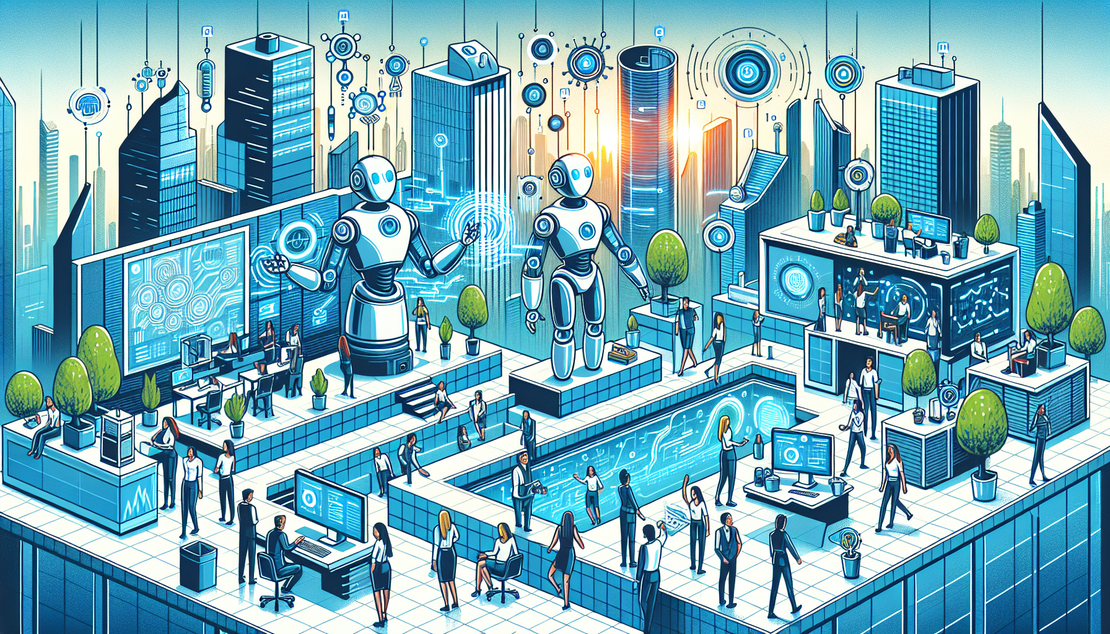
The Transformational Power of Business Automation and AI: A Roadmap to Success
- Rajdeep Barad
- Business automation , Ai technology , Digital transformation , Efficiency benefits , Ai implementation
- December 17, 2024
The Transformational Power of Business Automation and AI: A Roadmap to Success
Understanding Business Automation and AI
Business automation involves using technology to automate repetitive tasks and processes, while AI (Artificial Intelligence) refers to the simulation of human intelligence by machines.
Benefits of implementing automation and AI in business processes include increased efficiency, improved decision-making, enhanced customer experiences, and reduced operational costs.
Automation and AI differ from traditional business practices by enabling faster execution, data-driven insights, and the ability to handle complex tasks with minimal human intervention.
Common misconceptions about automation and AI include fears of job loss and a lack of human touch in customer interactions.
Real-world examples of successful implementation include chatbots for customer support, automated email marketing campaigns, and predictive analytics for sales forecasting.
Pro Tip: Ensure to educate your team about the benefits of automation and AI to foster a culture of innovation and adaptation in your organization.
The Role of Automation and AI in Streamlining Business Operations
Automating repetitive tasks not only saves time but also reduces the likelihood of errors, allowing employees to focus on more strategic activities.
AI technology can analyze large datasets quickly, providing valuable insights that aid in decision-making processes.
By implementing automation, businesses can enhance customer service by providing instant responses and personalized interactions.
AI significantly reduces human error in tasks like data entry and processing, leading to improved accuracy and efficiency.
Scalability and flexibility in operations are enhanced with automation, allowing businesses to adapt to changing market demands more effectively.
Pro Tip: Regularly review your automated processes and AI algorithms to ensure they align with your business goals and customer needs for optimal results.
Key Technologies Driving Automation and AI
Machine learning plays a vital role in automation, enabling systems to learn from data and improve over time without being explicitly programmed.
Natural language processing (NLP) is utilized for chatbots and virtual assistants, enhancing customer interactions through more natural conversations.
Robotic process automation (RPA) automates rule-based tasks, allowing for the automation of repetitive processes with speed and accuracy.
Predictive analytics uses historical data and machine learning algorithms to forecast trends and make informed decisions for business optimization.
Computer vision enables machines to interpret and understand the visual world, supporting applications like visual quality control and facial recognition.
Pro Tip: Stay updated on the latest advancements in AI technologies and consider how they can be integrated into your business operations to stay ahead of the competition.
Implementing Automation and AI Strategies in Your Business
Start by assessing your current business processes to identify areas where automation can bring the most significant benefits in terms of efficiency and cost savings.
Set clear goals and objectives for automation and AI implementation, ensuring alignment with your overall business strategy.
Choose tools and technologies that fit your specific business needs and budget, considering factors like scalability and ease of integration.
Provide adequate training to employees to ensure successful adoption of automation and AI tools, empowering them to work collaboratively with the new technology.
Measure the success of your automation initiatives through KPIs and feedback mechanisms, and iterate on solutions for continuous improvement.
Pro Tip: Involve employees from different departments in the automation implementation process to gather diverse perspectives that can enhance the effectiveness of the solution.
The Future of Business with Automation and AI
Trends like hyper-automation, AI ethics, and IoT integration are shaping the future of automation and AI in business, leading to increased efficiency and innovation.
Automation and AI play a crucial role in digital transformation by enabling organizations to digitize processes, enhance customer experiences, and stay competitive in the digital era.
Potential risks in adopting automation and AI include data privacy concerns, job displacement, and algorithmic bias, emphasizing the need for responsible use of these technologies.
Ethical considerations such as transparency, fairness, and accountability are essential in ensuring the ethical use of AI technologies in business scenarios.
To stay ahead in a competitive landscape, businesses should focus on continuous innovation, upskilling employees, and leveraging automation and AI for strategic advantage.
Pro Tip: Create a cross-functional team dedicated to monitoring AI deployment and its impact on various business functions to proactively address any emerging challenges or opportunities.
Ready to transform your digital vision?
Get in touch with us to explore how our cutting-edge solutions can elevate your business to new heights. Contact us today!
Get in Touch


